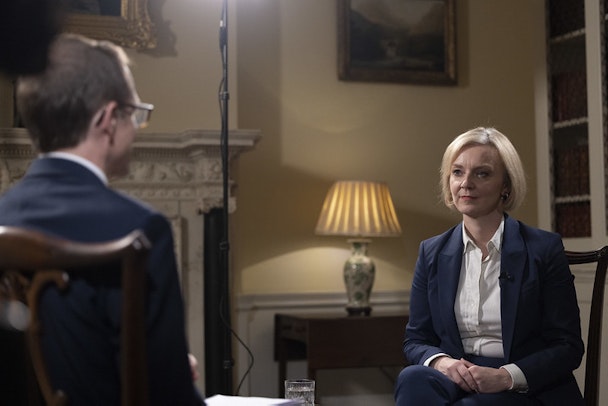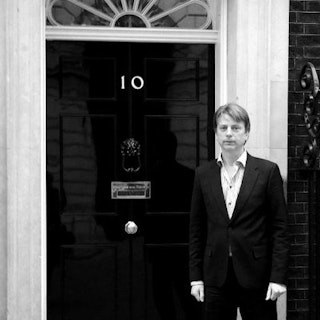Can Liz Truss cling on? Conservative adman on the PM’s possible survival strategy
As yet more brutal headlines greet the prime minister, advertising boss and Tory insider Michael Moszynski examines whether Liz Truss has any hope of surviving her credibility crisis.

The prime minister speaking to the BBC's Chris Mason in Downing Street / Simon Dawson / No 10 Downing Street
Can Liz Truss survive and what will the Conservative Party do next?
This was the brief from The Drum for me to write an article from the perspective of “someone with his ear to the inner workings of the Conservative Party”. A tough brief, but despite what most people are thinking, it is clear to me that the answer to the first question is ‘yes’ and to the second, please let me consult my Ouija board!
Well, the nearest to the latter is the overnight summary of the news on the Tory party’s bible (otherwise known as www.telegraph.co.uk) which led with “Can Liz Truss survive? Probably not” followed by “Order has been restored at breathtaking speed”. So in short, who knows?
Advertisement
The more interesting question is: what can she do to remain in power when there is so much pressure, even within her own party, for her to resign? The sacking of her political partner in mid-air, Kwasi Kwarteng, for implementing her own policy agenda seemed particularly brutal, even by the standards of political necessity. But more than this, it has potentially left her with no purpose in the highest office of state. As one senior Conservative put it yesterday, “she is at risk of being in office, but not in power”.
As the second Telegraph headline demonstrates, Jeremy Hunt and his ‘course corrections’ may have stabilized the government’s position economically, but not Truss's politically. My advice to her would be to find a way to apply her own political values to the current economic realignment and to do so with alacrity and vim.
The strategy to achieve this is based on the eternal advice “never waste a good crisis”. The real crisis at the heart of our problems is dealing with the consequence of Putin’s invasion of Ukraine, which has impacted economies globally. Specifically for the UK, it has resulted in us having to commit £60bn of unplanned expenditure in the form of the Energy Price Guarantee.
As a civilized society we of course had to step in. But the scale of this challenge is so enormous that government by itself cannot solve it. Nasa had an equally colossal challenge from JFK in 1963 “to put a man on the moon and return him safely to earth by the end of the decade”. Nasa recognized that as a state entity, it could never hire the range of people and skills to deliver this alone. So it developed a model of what we now call ‘collaborative advantage’ by partnering with private sector companies, academics and a host of best-in-class talent across America.
And that is exactly what the UK did in response to the Covid vaccine challenge, from the ranks of private equity, our universities, the NHS, government and the armed forces. The result was the world’s first successful Covid vaccine roll-out, carried out in less than a year versus the normal timescale of a decade.
Advertisement
I believe the opportunity for Truss is to unleash the best of British entrepreneurship, creativity, academic excellence and, yes, government, to help resolve the energy crisis ahead of the end of the Energy Price Guarantee in six months’ time. The way to achieve this is to accelerate the implementation of existing, proven technologies to dramatically reduce our energy usage immediately. A key part of the problem is bureaucracy, but it is in the government’s gift to ‘use the crisis’ to bulldoze through it.
Let me give you four examples I am aware of:
1. A company that deploys AI has proven to save large energy users, like a hospital, 25-27% of their costs, within 15 weeks, across the globe. It had a proposal to introduce it as a trial in a large UK university, but its procurement department wouldn’t let it sign a contract as it can’t get a competitive quote, even though it comes at no cost or risk to the institution. (The company implements it for free and is only paid via a percentage of any future saving). With a government mandate this could be in place by Q1 2023.
2. Another company spent six months selling a hardware solution into an NHS Trust that is saving it 27% off its cooling/refrigeration energy costs. But every time it goes to another NHS Trust, it is told it will have to start the procurement process again from scratch “as it might not work for them” despite five trusts now receiving these savings. Madness.
3. Did you know that our grid runs on 242 volts but that 90+% of our devices run on 220 volts? A company has a product that resolves this and, thanks to Ohm’s law, provides savings of 10-12% on the electric consumption on any supply point. It has been selling it into schools, but typically what it hears is “we are waiting for government to tell us what to do” or “if do this we might lose some of our central funding”. Strewth.
4. Have you ever seen the yellow flame in your boiler around the blue flame? Like a Bunsen burner experiment, that is wasted gas. A simple self-fit product on your pipes will ensure your flame is consistently blue, saving you 10% of your bill, paying for itself in year one. Wouldn’t you want one of those?
Suggested newsletters for you
There must be many more ideas like these. So, if I was the prime minister, I would immediately appoint Nadhim Zihawi (who so successfully spearheaded the UK’s vaccine effort) as secretary of state for energy efficiency to drive a program to rapidly identify, and evaluate such ideas, with a cross-departmental brief to implement them across government estates, as well as bring to market how businesses and households can do the same.
I would also amend the Energy Price Guarantee from January 1 to cover just the first 75% of every energy bill, which means no one would not be able to heat their house. But with the next 25% of your bill costing two-three times more, this would positively leverage market prices to change behavior. This will save energy, carbon emissions and the Treasury £7.5bn at a stroke.
To maximize this behavior change I would also execute a national communications campaign, with an associated retail promotion arm with the likes of B&Q, to promote five simple ways every household can save money on energy bills, for example switching 100w bulbs to 7w LED bulbs. Such changes can pay for themselves in year one yet deliver long-term recurring savings. (My personal tip is to refuse to discuss global warming with my kids if they leave their lights on when they leave their room.)
Will this be enough to ensure Truss survives? I don’t know, but I do know that doing nothing means she won’t. Who knows, she could even leave an enduring political and economic legacy: capitalism for good.
Michael Moszynski is chief executive of London Advertising.

